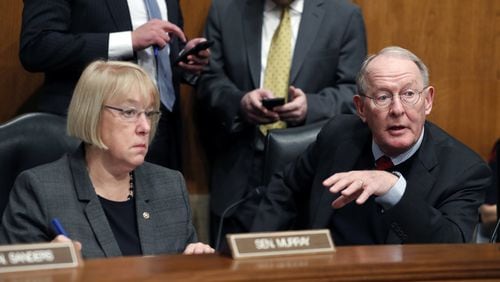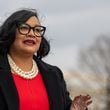There is now a clear price tag for for Washington’s dysfunction on health care and many Georgians could soon begin paying it.
Insurance companies that cover Georgia's Obamacare exchange customers have finalized their new rate increases for 2018. If Washington continues to avoid a final decision on the insurance subsidies called cost-sharing reductions, the state Department of Insurance announced Wednesday that Georgia rates will rise dramatically — even more than previously thought.
Every single one of the four companies offering policies on the exchange here plans to raise their rates by an average of more than 50 percent, if Washington does not give certainty on the subsidy funding.
In Washington, a U.S. Senate committee led by Sen. Lamar Alexander of Tennessee hoped to give that certainty, negotiating with Democrats on a fix to the law.
But last week he gave up as the Senate was overwhelmed by another effort to repeal Obamacare.
In the list of rate increases released Wednesday, Blue Cross Blue Shield’s average Georgia Obamacare rate increase would be the largest, at 57.5 percent over 2017.
But even companies that originally filed for mild double-digit increases are now going for the gold as well. Ambetter, Alliant and Kaiser each plan to raise rates from 51 percent on average to 56.7 percent on average.
It doesn’t have to be that way, according to the list. In comparison, if Washington does assure the industry that the subsidies won’t be yanked, the rate increases would be perhaps 25 percentage points lower.
“Oh my gosh,” said Kirk Lyman-Barner, who sells Obamacare plans in Middle Georgia. Blue Cross pulled out of the individual market in his area so he’ll now have to sell Ambetter, but both are increasing significantly. “It’s going to be awful for the folks who have to pay the full rate without a subsidy.”
Right now, the cost-sharing reduction subsidies are being paid, but they’re threatened.
GOP leaders in the House of Representatives sued to stop the administration from paying them, and President Trump has occasionally seemed to agree, or called them “BAILOUTS.” Most agree that the best way to calm the waters is for Congress to decide definitively whether to appropriate them, as Alexander was trying to do.
That means rates aren’t rising because the government is saving money on subsidies right now; it’s paying the money. Instead, the price hike for Georgians looms so large because Washington has not stepped up. Insurance companies are reacting.
Lyman-Barner has questioned why the rates have to be raised so much, and whether the companies are taking advantage.
Even though companies already said they were pricing in the uncertainty when they raised rates this summer, consultant Chris Kane said there could be a reason for further increases. "I agree the mechanics of the process are the same" as pricing this past summer: "Is it going to be CSR (cost-sharing reduction subsidy) or not," Kane said. "But I would submit there's this additional qualitative assessment not only of the market but of the country" — with even more water under the bridge in Washington showing inability to work on policy since then.
Blue Cross in a statement acknowledged the “volatility” of the proposed plans, and cited the cost-sharing reduction uncertainty, as well as rising health care costs generally.
The Cost of Uncertainty
Georgia Obamacare customers will pay one rate if “cost-sharing reduction” federal subsidies are assured to continue through appropriation, and a much higher rate if the uncertainty continues month-to-month, insurance officials said Wednesday. The rates published Wednesday are below.
Alliant Health Plans
- With CSR certainty: 31.0%
- Without CSR certainty: 53.3%
BCBS Healthcare of Georgia
- With CSR certainty: 40.6%
- Without CSR certainty: 57.5%
Kaiser Foundation Health
- With CSR certainty: 30.6%
- Without CSR certainty: 56.7%
Ambetter of Peach State
- With CSR certainty: 23.8%
- Without CSR certainty: 51.0%








